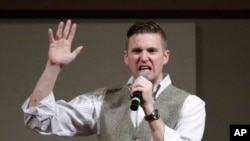The University of Florida campus in Gainesville was on edge Wednesday, a day before white nationalist Richard Spencer is scheduled to speak there.
The school has called in hundreds of law enforcement officers from federal, state, county and city sources in an effort to avoid a repeat of the deadly violence that erupted in August at the University of Virginia in Charlottesville.
The University of Florida initially denied Spencer’s request to speak there but later university president Kent Fuchs said the First Amendment of the U.S. Constitution required it to allow the event.
Fuchs estimates the school will spend $600,000 on security for Spencer’s speech Thursday.
The National Policy Institute, which is run by Spencer, is paying $10,564 to rent space for the speech.
“I fully understand freedom of speech cannot be burdened legally with the full cost of this, but on the other hand we’re being burdened,” Fuchs said Wednesday. “So taxpayers are subsidizing hate speech.”
In anticipation of trouble, Florida Governor Rick Scott declared a state of emergency Monday, saying a "threat of a potential emergency is imminent'' in Alachua County, where the school is located.
In his order, Scott cited several Spencer appearances that have resulted in violence and "civil unrest," including in Charlottesville where a counterdemonstrator was killed.
Carrying torches, Spencer's supporters were joined by the Ku Klux Klan and neo-Nazis at the “Unite the Right” rally to protest the removal of a statue honoring Confederate General Robert E. Lee. They clashed with local law enforcement officials as well as counterprotesters that included the so-called antifa movement (short for anti-fascists).
After Scott's emergency declaration, Fuchs said the school received many calls from parents concerned about safety.
“Parents want to know, ‘Why is the governor declaring a state of emergency and yet you, President Fuchs, are saying my son or daughter should be going to class?’ That (announcement) elevated that tension, locally with parents and brought a national visibility to this,” Fuchs said.
Fuchs said he hopes the event will end up bringing the community closer together, and that it can be used to create a dialogue about race.
